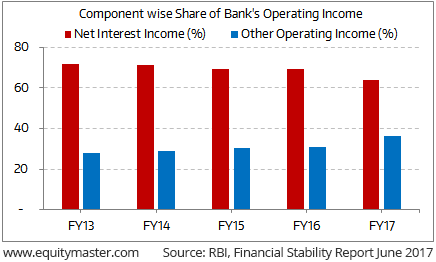- Home
- Todays Market
- Indian Stock Market News August 18, 2017
Weak Finish to the Week Post Vishal Sikka's Exit as CEO of Infosys Fri, 18 Aug Closing
Share markets in India witnessed selling pressure, led by slump in shares of Infosys Ltd. after Vishal Sikka resigned as chief executive officer of the country's second-largest software services exporter. At the closing bell, the BSE Sensex closed lower by 271 points. While, the NSE Nifty finished lower by 67 points. Meanwhile, the S&P BSE Midcap Index and the S&P BSE Small Cap Index ended down by 0.1%& 0.5% respectively.
Among BSE sectoral indices, IT index fell the most by 3.5%, healthcare 1.6% and realty 1%. Only oil & gas stocks, consumer durables stocks and FMCG stocks witnessed buying interest.
Major Sensex losers were Infosys (-9.6%), Sun Pharma (-3.8%), and NTPC (-2%) among others.
Overseas, Asian equity markets finished mixed to lower as of the most recent closing prices. Shares in Japan fell as the Nikkei 225 dropped 1.18%. The Hang Seng lost 1.08% while the Shanghai Composite in China closed unchanged. European stocks are lower today, with the Stoxx 600 falling 0.9%, as a global flight from riskier assets on the back of political turmoil in the US rumbles on.
The rupee was trading at Rs 64.10 against the US$ in the afternoon session. Oil prices were trading at US$ 47.39 at the time of writing.
Pharma stocks closed the day on a mixed note with Strides Shasun and Lupin leading the losses.At a time when investors were expecting Infosys to spell out the detailed terms of its proposed Rs 130billion buyback programme, Vishal Sikka resigned as the managing director and chief executive of the company.
He, however, will continue as the executive vice-chairman at Infosys, as per the reports.
The development sent the stock plummeting down over 11% in intra-day deals on the Bombay Stock Exchange (BSE) to Rs 904 levels.
Reportedly, Mr. Narayan Murthy's continuous assault is the primary reason that the CEO, Dr. Vishal Sikka, has resigned despite strong Board support.
However, Vishal Sikka said he will continue to serve Infosys till 31 March 2018 or till a "great stable management" is in place. In the meantime, COO (chief operating officer) UB Pravin Rao will act as the interim CEO and MD reporting to Sikka.
During this period Sikka will focus on strategic relationships, and will make sure the technology development continues at Infosys.
Moving on to the news from the IPO space. The State Bank of India (SBI) is looking to launch an initial public offering (IPO) of two rural banks in the next one year.
This is the first time that such a move will be taken up by a public-sector bank.
Andhra Pradesh Grameena Vikas Bank and Saurashtra Gramin Bank are the rural regional banks (RRBs) which will float IPOs, with the main intention of improving efficiency and creating value.
One must note that, SBI was able to carry out the IPO of the RRBs with the creation of the RRB Act in 2015. It allowed the RRBs to raise capital from other sources apart from the government and sponsor banks.
In another development, two leading lenders PNB, HDFC Bank slashed interest rate on savings bank accounts by 50 basis points to 3.5% on deposits up to Rs 5million.
Besides, Punjab National Bankhas also reduced interest rates on fixed deposits of less than Rs 10million by 15-40 basis points on select maturities.
All major banks have announced cut in interest rates on savings deposits after RBI slashed repo rate in its bi-monthly monetary policy statement on 2 August. Only SBI had announced the interest rate cut on savings bank accounts on 31 July.
Meanwhile, after dwindling to single-digits in the past three years, bank credit growth slowed down to a multi-decade low of 4.4% in FY17. This has curtailed Net Interest Income which is the core source of income for banks.
Slow Credit Growth Impairs Core Income Driver for Banks
Net Interest Income is the interest income earned after adjusting for interest expense made in the form of cost of funds and deposits. The share of Net Interest Income in the bank's total operating income fell from 72% in FY 13 to 64% in FY17.
As per RBI data, the incremental credit-deposit ratio crossed 100 in July 2017 for the first time since 2011. At the same time, the incremental investment-deposit ratio has been on a steady decline.
This shows that as huge deposits garnered by public sector banks post notebandi are stabilising, lending is slowly gaining traction.
For the same reason, public sector banks have cut savings rate as they shift focus towards lending. Even the smaller banks are expected to follow suit. This paves way for rate cuts in corporate loans to fuel the pick-up in credit demand and boost interest income for banks.
For information on how to pick stocks that have the potential to deliver big returns, download our special report now!
Read the latest Market Commentary



Equitymaster requests your view! Post a comment on "Weak Finish to the Week Post Vishal Sikka's Exit as CEO of Infosys". Click here!
Comments are moderated by Equitymaster, in accordance with the Terms of Use, and may not appear
on this article until they have been reviewed and deemed appropriate for posting.
In the meantime, you may want to share this article with your friends!